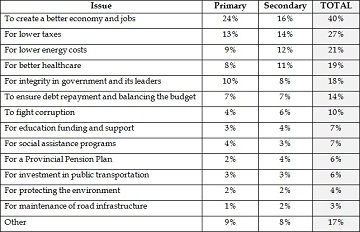Economy and Jobs Top Issue of Ontario Campaign
When asked what primary issue they want their vote to count for on Election Day, the economy and jobs (24%) is mentioned by one quarter of Ontarians with no other issue close to this level of importance--in second place is lower taxes (13%) followed by integrity in government and its leaders (10%).
Other primary issues that Ontarians are using their vote for include: lower energy costs (9%), better healthcare (8%), ensuring debt repayment and balancing the budget (7%), fighting corruption (4%), social assistance programs (4%), investing in public transportation (3%), education funding and support (3%), protecting the environment (2%), the institution of a provincial pension plan (2%), maintenance of road infrastructure (1%), or some other issue (9%).
- Among Progressive Conservative voters, the top issues are: the economy and jobs (25%), ensuring debt repayment and balanced budget (19%), lower energy costs (14%), integrity (13%) and lower taxes (10%).
- For Liberal voters, the top issues are: the economy (27%), integrity (12%), lower taxes (10%), and better healthcare (10%).
- For NDP voters, the top issues are: the economy (27%), social assistance programs (14%), healthcare (9%), lower energy costs (8%) and lower taxes (8%).
The data also reveal some interesting differences based on key demographic segments within Ontario:
- Men (11%) are more likely than women (4%) to think that debt repayment and balancing the budget is the top issue.
- Middle-aged (35-54) Ontarians are more likely (30%) than older, aged 55+ (25%) and younger, aged 18-34 (16%) adults to believe that the economy is the top issue.
- Those in the 416 area code are more concerned with public transportation as a top issue (10%) than the average Ontarian (3%).
- Integrity is also a more important issue for those in the 416 (17%) than the average Ontarian (10%).
Adding it all Up...
Ontarians were then asked to select the second issue that was influencing their vote. Adding the primary and secondary issue together produced a clear list of the central issues in the campaign and also helps understand the platforms of the various parties.
Adding the primary and secondary issue voting motivators has "to create a better economy and jobs" (40%) by far at the top of the list followed by lower taxes (27%), lower energy costs (21%), better healthcare (19%), integrity in government and its leaders (18%), ensure debt repayment and a balanced budget (14%), fight corruption (10%), education funding and support (7%), social assistance programs (7%), investment in public transit (6%), provincial pension plan (6%), protecting the environment (4%) and maintenance of road infrastructure (3%). "Other issues" added up to 17%.
Driving Emotions...
Ontarians were then asked to consider what emotion could be driving them to vote: fearful that another party could win, angry and don't want a party to win or neither.
Overall, the survey finds that 15% of Ontarians are driven by anger to cast their ballot because they don't want a party to win while another 27% are being driven because they are fearful that another party could win. Six in 10 (58%) did not identify with either emotion.
However, it's instructive to see how committed voters are reacting to the emotional polarities.
For committed voters for which nothing short of an emergency would stop them from heading to the polls (50%), 35% are doing so because they are fearful that another party could win compared with 22% who are angry and don't want a party to win (43% say neither).
For committed PC voters, they are being driven equally by anger (29%) and fear (29%) that another party could get into power - 42% say neither.
For committed Liberal voters, 45% are being driven to the polls because they are fearful that another party could win compared to only 8% who are being driven by anger and don't want another party to win - 46% say neither.
For committed NDP voters, 28% are being driven by fear that another party could win while 14% are angry and don't want a party to win - 59% say neither.
These are some of the findings of an Ipsos Reid poll conducted between May 12 to 14, 2014, on behalf of CTV and CP24. For this survey, a sample of 801 Ontarians, from Ipsos' Canadian online panel was interviewed online. Weighting was then employed to balance demographics to ensure that the sample's composition reflects that of the adult population according to Census data and to provide results intended to approximate the sample universe. The precision of Ipsos online polls is measured using a credibility interval. In this case, the poll is accurate to within +/-3.9 percentage points had all adults in Ontario been surveyed.
For more information on this news release, please contact:
John Wright
Senior Vice President
Ipsos Reid
Public Affairs
416.324.2002
[email protected]
About Ipsos Reid
Ipsos Reid is Canada's market intelligence leader, the country's leading provider of public opinion research, and research partner for loyalty and forecasting and modelling insights. With operations in eight cities, Ipsos Reid employs more than 600 research professionals and support staff in Canada. The company has the biggest network of telephone call centres in the country, as well as the largest pre-recruited household and online panels. Ipsos Reid's marketing research and public affairs practices offer the premier suite of research vehicles in Canada, all of which provide clients with actionable and relevant information. Staffed with seasoned research consultants with extensive industry-specific backgrounds, Ipsos Reid offers syndicated information or custom solutions across key sectors of the Canadian economy, including consumer packaged goods, financial services, automotive, retail, and technology & telecommunications. Ipsos Reid is an Ipsos company, a leading global survey-based market research group.
To learn more, please visit www.ipsos.ca.
About Ipsos
Ipsos is an independent market research company controlled and managed by research professionals. Founded in France in 1975, Ipsos has grown into a worldwide research group with a strong presence in all key markets. Ipsos ranks third in the global research industry.
With offices in 86 countries, Ipsos delivers insightful expertise across six research specializations: advertising, customer loyalty, marketing, media, public affairs research, and survey management.
Ipsos researchers assess market potential and interpret market trends. They develop and build brands. They help clients build long-term relationships with their customers. They test advertising and study audience responses to various media and they measure public opinion around the globe.
Ipsos has been listed on the Paris Stock Exchange since 1999 and generated global revenues of e1,712,4 million (2 274 M$) in 2013.
Visit www.ipsos.com to learn more about Ipsos' offerings and capabilities.




